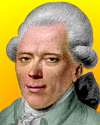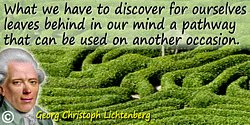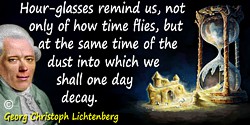 (source)
(source)
|
Georg Christoph Lichtenberg
(1 Jul 1742 - 24 Feb 1799)
German physicist and writer most widely known for his satire and aphorisms, but as a scientist, Lichtenberg did research in a wide variety of fields, including geophysics, volcanology, meteorology, chemistry, astronomy, mathematics, but especially physics. He discovered the basic physical process later used in xerographic copiers.
|
Georg Christoph Lichtenberg Quotes on Man (15 quotes)
>> Click for 73 Science Quotes by Georg Christoph Lichtenberg
>> Click for Georg Christoph Lichtenberg Quotes on | Belief | Discovery | Genius | Nature | Science | Theory | Thinking | Truth | World |
>> Click for 73 Science Quotes by Georg Christoph Lichtenberg
>> Click for Georg Christoph Lichtenberg Quotes on | Belief | Discovery | Genius | Nature | Science | Theory | Thinking | Truth | World |
[Someone] remarked to me once: Physicians should not say, I have cured this man, but, This man didn’t die in my care. In physics too one might say, For such and such a phenomenon I have determined causes whose absurdity cannot finally be proved, instead of saying, I have explained it.
— Georg Christoph Lichtenberg
As quoted in Joseph Peter Stern, Lichtenberg: A Doctrine of Scattered Occasions: Reconstructed From His Aphorisms and Reflections (1959), 297.
A man who writes a great deal and says little that is new writes himself into a daily declining reputation. When he wrote less he stood higher in people’s estimation, even though there was nothing in what he wrote. The reason is that then they still expected better things of him in the future, whereas now they can view the whole progression.
— Georg Christoph Lichtenberg
Aphorism 43 in Notebook D (1773-1775), as translated by R.J. Hollingdale in Aphorisms (1990). Reprinted as The Waste Books (2000), 50.
Astrology fosters astronomy. Mankind plays its way up.
— Georg Christoph Lichtenberg
The original German “Astrologie fördert Astronomie. Die Menschen spielen sich in die Höhe,” appears in Ernst Volkmann (ed.), Aphorismen: Eine Sammlung aus Lichtenbergs Gedankenbüchern (1944), 85. However, so far, this is the only German source found by Webmaster. English as gived in H.W. Auden, The Faber Book of Aphorisms (1962), 261.
Astronomy is perhaps the science whose discoveries owe least to chance, in which human understanding appears in its whole magnitude, and through which man can best learn how small he is.
— Georg Christoph Lichtenberg
Aphorism 23 in Notebook C (1772-1773), as translated by R.J. Hollingdale in Aphorisms (1990). Reprinted as The Waste Books (2000), 35.
God created man in his own image, says the Bible; the philosophers do the exact opposite, they create God in theirs.
— Georg Christoph Lichtenberg
Aphorism 48 in Notebook D (1773-1775), as translated by R.J. Hollingdale in Aphorisms (1990). Reprinted as The Waste Books (2000), 51.
I have very often reflected on what it is that really distinguishes the great genius from the common crowd. Here are a few observations I have made. The common individual always conforms to the prevailing opinion and the prevailing fashion; he regards the State in which everything now exists as the only possible one and passively accepts it ail. It does not occur to him that everything, from the shape of the furniture up to the subtlest hypothesis, is decided by the great council of mankind of which he is a member. He wears thin-soled shoes even though the sharp stones of the Street hurt his feet, he allows fashion to dictate to him that the buckles of his shoes must extend as far as the toes even though that means the shoe is often hard to get on. He does not reflect that the form of the shoe depends as much upon him as it does upon the fool who first wore thin shoes on a cracked pavement. To the great genius it always occurs to ask: Could this too not be false! He never gives his vote without first reflecting.
— Georg Christoph Lichtenberg
Aphorism 24 in Notebook C (1772-1773), as translated by R.J. Hollingdale in Aphorisms (1990). Reprinted as The Waste Books (2000), 36.
If an angel were to tell us about his philosophy, I believe many of his statements might well sound like '2 x 2= 13'.
— Georg Christoph Lichtenberg
Lichtenberg: Aphorisms & Letters (1969), 31.
If we make a couple of discoveries here and there we need not believe things will go like this for ever. An acrobat can leap higher than a farm-hand, and one acrobat higher than another, yet the height no man can overleap is still very low. Just as we hit water when we dig in the earth, so we discover the incomprehensible sooner or later.
— Georg Christoph Lichtenberg
Aphorisms, trans. R. J. Hollingdale (1990), 92.
Man is perhaps half spirit and half matter, as the polyp is half plant and half animal. The strangest of creatures lie always at the boundary.
— Georg Christoph Lichtenberg
Aphorism 30 in Notebook D (1773-1775), as translated by R.J. Hollingdale in Aphorisms (1990). Reprinted as The Waste Books (2000), 48.
Many people know everything they know in the way we know the solution of a riddle after we have read it or been told it, and that is the worst kind of knowledge and the kind least to be cultivated; we ought rather to cultivate that kind of knowledge which enables us to discover for ourselves in case of need that which others have to read or be told of in order to know it.
— Georg Christoph Lichtenberg
Aphorism 89 in Notebook D (1773-1775), as translated by R.J. Hollingdale in Aphorisms (1990). Reprinted as The Waste Books (2000), 58.
Of all the animals on earth, man is closest to the ape.
— Georg Christoph Lichtenberg
Aphorism 19 in Notebook B (1768-1771), as translated by R.J. Hollingdale in Aphorisms (1990). Reprinted as The Waste Books (2000), 21.
That is as natural to man as thinking or throwing snowballs.
— Georg Christoph Lichtenberg
Aphorism 18 in Notebook C (1772-1773), as translated by R.J. Hollingdale in Aphorisms (1990). Reprinted as The Waste Books (2000), 34.
That man is the noblest creature may also be inferred from the fact that no other creature has yet contested this claim.
— Georg Christoph Lichtenberg
Aphorism 58 in Notebook D (1773-1775), as translated by R.J. Hollingdale in Aphorisms (1990). Reprinted as The Waste Books (2000), 52.
The man was such an intellectual he was of almost no use.
— Georg Christoph Lichtenberg
Aphorism 74 in Notebook D (1773-1775), as translated by R.J. Hollingdale in Aphorisms (1990). Reprinted as The Waste Books (2000), 55.
To see every day how people get the name “genius” just as the wood-lice in the
cellar the name “millipede”—not because they have that many feet, but because most people don't want to count to 14—this has had the result that I don't believe anyone any more without checking.
— Georg Christoph Lichtenberg
Lichtenberg: Aphorisms & Letters (1969), 48, translated by Franz H. Mautner and Henry Hatfield.
See also:
- 1 Jul - short biography, births, deaths and events on date of Lichtenberg's birth.



 In science it often happens that scientists say, 'You know that's a really good argument; my position is mistaken,' and then they would actually change their minds and you never hear that old view from them again. They really do it. It doesn't happen as often as it should, because scientists are human and change is sometimes painful. But it happens every day. I cannot recall the last time something like that happened in politics or religion.
(1987) --
In science it often happens that scientists say, 'You know that's a really good argument; my position is mistaken,' and then they would actually change their minds and you never hear that old view from them again. They really do it. It doesn't happen as often as it should, because scientists are human and change is sometimes painful. But it happens every day. I cannot recall the last time something like that happened in politics or religion.
(1987) -- 


